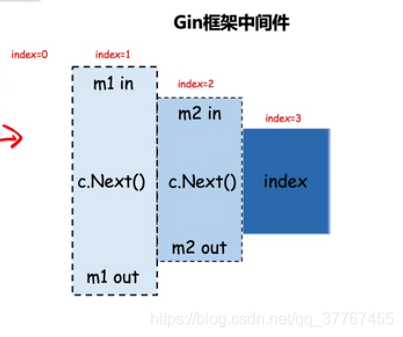社区微信群开通啦,扫一扫抢先加入社区官方微信群

社区微信群
社区微信群开通啦,扫一扫抢先加入社区官方微信群

社区微信群
//HandlerFunc
func indexHandler(c *gin.Context) {
fmt.Println("index")
c.JSON(http.StatusOK, gin.H{
"msg": "index",
})
}
//定义一个中间件
func m1(c *gin.Context) {
fmt.Println("m1 in ...")
// 计时
start := time.Now()
c.Next() //调用后续的处理函数
//c.Abort() //阻止调用后续的处理函数
cost := time.Since(start)
fmt.Printf("cost:%vn", cost)
fmt.Printf("m1 out ...")
}
func m2(c *gin.Context) {
fmt.Println("m2 in ...")
c.Next() //调用后续的处理函数
fmt.Println("m2 out ...")
}
func main() {
r := gin.Default()
//点GET查看源码发现
//GET(relativePath string, handlers ...HandlerFunc) IRoutes 另外,...表示 可传多个HandlerFunc类型的函数
//r.GET("/index", m1, indexHandler)
//r.GET("/shop", m1, func(c *gin.Context) {
// c.JSON(http.StatusOK, gin.H{
// "msg": "shop",
// })
//})
//r.GET("/user", m1, func(c *gin.Context) {
// c.JSON(http.StatusOK, gin.H{
// "msg": "user",
// })
//})
// 点开Use 查看源码发现 Use(middleware ...HandlerFunc) IRoutes
r.Use(m1, m2) //全局注册中间件函数m1 m2
/*访问/index
执行indexHandler之前 去执行注册的中间件 总的执行打印顺序是:m1 in -> m2 in -> index -> m2 out -> m1 out
*/
r.GET("/index", indexHandler)
r.GET("/shop", func(c *gin.Context) {
c.JSON(http.StatusOK, gin.H{
"msg": "shop",
})
})
r.GET("/user", func(c *gin.Context) {
c.JSON(http.StatusOK, gin.H{
"msg": "user",
})
})
r.Run(":9090")
}
执行结果:
执行逻辑:
代码执行图解:
上面代码把m2这里改成阻止,其他地方不变,如下图:
此时执行,控制台打印输出为:
m1 in -> m2 in ->m2 out -> m1 out
代码执行图解:
当然,如果连 m2 out 都不想让它输出的话,那直接在c.Abort() 语句 后return就可以了,如下图:
//HandlerFunc
func indexHandler(c *gin.Context) {
fmt.Println("index")
name, ok := c.Get("name") //取值 实现了跨中间件取值
if !ok{
name = "default user"
}
c.JSON(http.StatusOK, gin.H{
"msg": name,
})
}
//定义一个中间件
func m1(c *gin.Context) {
fmt.Println("m1 in ...")
// 计时
start := time.Now()
//gin中间件中使用goroutine
//当在中间件或handler中启动新的goroutine时,不能使用原始的上下文(c *gin.Context),必须使用其只读副本(c.Copy())
go otherFunc(c.Copy()) // 在otherFunc中只能使用c的拷贝
c.Next() //调用后续的处理函数
//c.Abort() //阻止调用后续的处理函数
cost := time.Since(start)
fmt.Printf("cost:%vn", cost)
fmt.Printf("m1 out ...")
}
func m2(c *gin.Context) {
fmt.Println("m2 in ...")
c.Set("name", "tony") //可以在请求上下文里面设置一些值,然后其他地方取值
c.Abort() //阻止调用后续的处理函数 也就是 m2它自己走完就行
//return
fmt.Println("m2 out ...")
}
// 自定义认证中间件 通过这种方式实现一些灵活的控制
func authMiddleware(doCheck bool)gin.HandlerFunc {
//连接数据库
// 或其他一些准备工作
return func(c *gin.Context) {
if doCheck {
//这里存放具体的逻辑
// 是否登录的判断
// if 是登录用户
c.Next()
// else
// c.Abort()
}else {
c.Next()
}
}
}
func main() {
r := gin.Default()
// 点开Use 查看源码发现 Use(middleware ...HandlerFunc) IRoutes
r.Use(m1, m2, authMiddleware(true)) //全局注册中间件函数m1 m2 authMiddleware
/*访问/index
执行indexHandler之前 去执行注册的中间件 总的执行打印顺序是:m1 in -> m2 in -> index -> m2 out -> m1 out
*/
r.GET("/index", indexHandler)
r.GET("/shop", func(c *gin.Context) {
c.JSON(http.StatusOK, gin.H{
"msg": "shop",
})
})
r.GET("/user", func(c *gin.Context) {
c.JSON(http.StatusOK, gin.H{
"msg": "user",
})
})
/* 路由组注册中间件方法1
routeGroup1 := r.Group("/xx", authMiddleware(true)){
routeGroup1.GET("/index", func(c *gin.Context) {
c.JSON(http.StatusOK, gin.H{"msg": "routeGroup1"})
})
}
路由组注册中间件方法2
routeGroup2 := r.Group("/xx2")
routeGroup2.Use(authMiddleware(true)){
routeGroup2.GET("/index", func(c *gin.Context) {
c.JSON(http.StatusOK, gin.H{"msg": "routeGroup2"})
})
}
*/
r.Run(":9090")
}
如果觉得我的文章对您有用,请随意打赏。你的支持将鼓励我继续创作!
